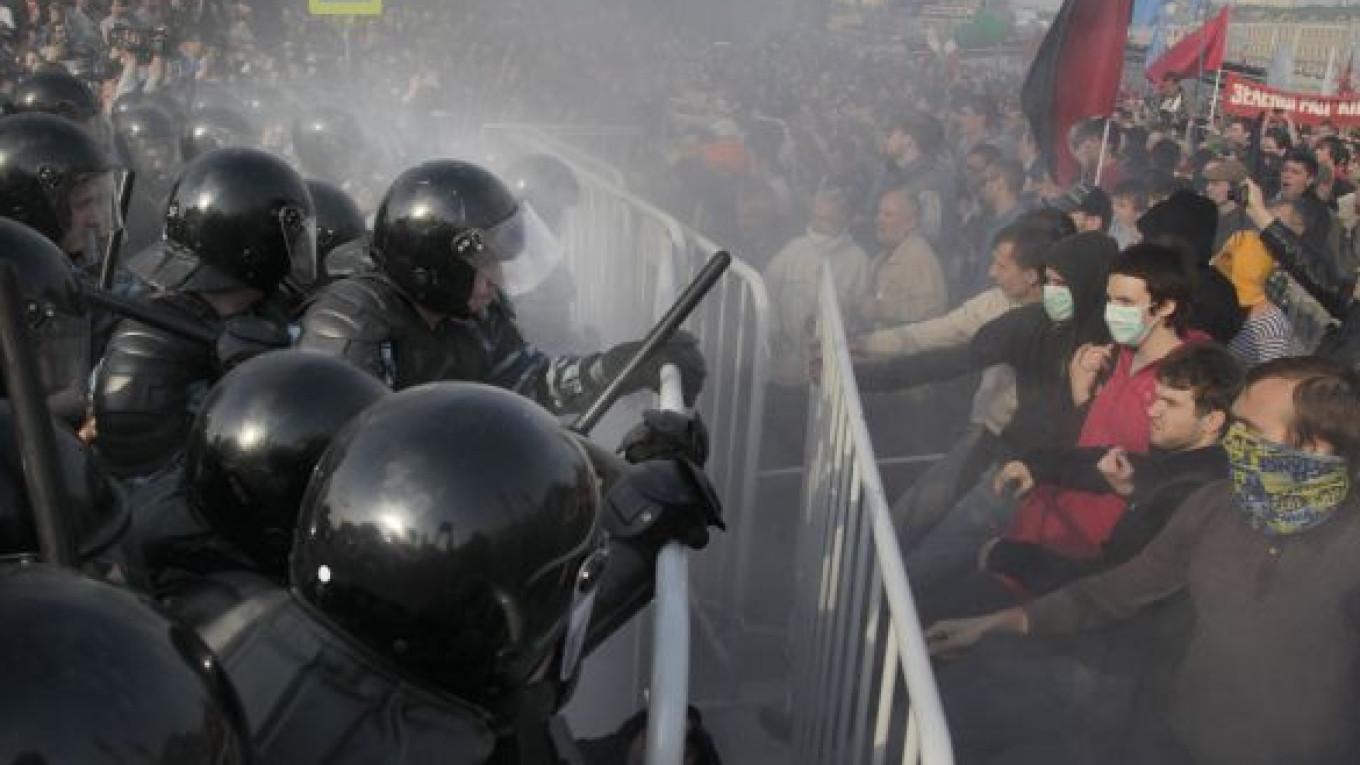A man professing to be a former government operative has said that police officials, including the former interior minister, were involved in organizing clashes at an opposition rally last year, allegations that members of the Kremlin human rights council say could be trustworthy.
The online television channel Politvestnik posted a video interview on YouTube earlier this week with the man, who called himself Felix.
Felix said he had worked as a paid political provocateur for entrepreneur Bashir Kushtov, who allegedly worked for former Interior Minister Rashid Nurgaliyev. He said he was offered money by Kushtov to create chaos at a rally on Bolotnaya Ploshchad on May 6, the day before Vladimir Putin's presidential inauguration.
The police wanted to provoke violence to show that they could work well in adverse conditions, thereby demonstrating that Nurgaliyev was an effective interior minister, Felix said.
"Kushtov told me that Putin guaranteed to Nurgaliyev that he would be interior minister for two more years, but he needed to make a good showing," Felix said.
The circumstances surrounding the clashes between police and anti-Putin protesters have been scrutinized closely by both authorities and the opposition, who each blame the other for organizing the violence.
About 20 people are accused of attacking police in the clashes, and opposition leader Sergei Udaltsov and two of his associates have been charged with organizing them.
Members of the Kremlin human rights council have placed the blame on police for initiating the confrontation and say they think Felix's testimony could be trustworthy.
"I'm sure that the clashes at Bolotnaya were carefully planned by authorities," Pavel Chikov, a human rights council member and the head of the Agora human rights group, said by phone. "There is enough evidence [of that]. That is why information provided by Felix could be true."
Felix said Kushtov offered him 50,000 rubles and an "unlimited budget" to hire people who would push participants of the opposition rally into fighting with police using flares, tear gas and creating bottlenecks in the crowd. He said he did not accept Kushtov's offer.
Fellow council member Ilya Shablinsky said that he considered the information to be trustworthy and that the council would take it into account in further investigation into the clashes, Nezavisimaya Gazeta reported Thursday.
Sergei Sharov-Delone, a member of the May 6 Committee, an independent organization conducting an investigation into the clashes, said it had done research on him and couldn't conclude that he was a reliable source.
"He indeed was a provocateur at multiple rallies — there are lots of videos on the Internet that prove it — but he's a shady man and we can't fully trust him," Sharov-Delone said by phone.
But he said there had been other reports of provocateurs being active at the rally.
"There were direct suspicions of provocateurs' involvement before this interview. I personally saw people who were standing inside police lines and attacked protesters, and police didn't detain them," Sharov-Delone said.
Felix said in the video that he started to organize provocations last April with a protest against United Russia Deputy Alexander Khinshtein, who opposed Interior Ministry policy.
Khinshtein told Nezavisimaya Gazeta that he had suspected Nurgaliyev of being behind the protests against him.
A member of the Interior Ministry's public council said Thursday that the council would discuss the information provided by Felix.
"State authorities and the public definitely must check all information, especially that which has social value," Anton Tsvetkov told Russian News Service.
A source close to Nurgaliyev told Interfax that he thought the interview was a fake. "A typical method of spreading false information was used in this case: First, it was put on the Internet and then picked up by newspapers," he said, adding that all the information Felix gave was "nonsense."
Journalist Alexander Sotnik, who conducted the interview with Felix, wrote on his Facebook page that the interview was published after Felix left Russia for an unidentified European country.
Sotnik said he believed that Felix had been mostly truthful in the interview.
"I'm ambivalent about the man: He is not sane enough, but it's possible he is being used to carry out someone else's plans," Sotnik said by email. "He loves money, so probably they fooled him and, having hard feelings, he decided to go to the other side."
"He's an adventurer. But that doesn't exclude that he told the truth, or most of it, and the rest decided to keep for a future story," he said.
Contact the author at e.kravtsova@imedia.ru
Related articles:
A Message from The Moscow Times:
Dear readers,
We are facing unprecedented challenges. Russia's Prosecutor General's Office has designated The Moscow Times as an "undesirable" organization, criminalizing our work and putting our staff at risk of prosecution. This follows our earlier unjust labeling as a "foreign agent."
These actions are direct attempts to silence independent journalism in Russia. The authorities claim our work "discredits the decisions of the Russian leadership." We see things differently: we strive to provide accurate, unbiased reporting on Russia.
We, the journalists of The Moscow Times, refuse to be silenced. But to continue our work, we need your help.
Your support, no matter how small, makes a world of difference. If you can, please support us monthly starting from just $2. It's quick to set up, and every contribution makes a significant impact.
By supporting The Moscow Times, you're defending open, independent journalism in the face of repression. Thank you for standing with us.
Remind me later.


